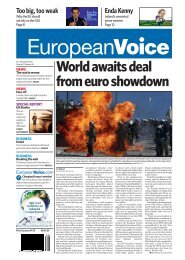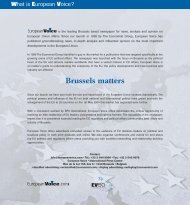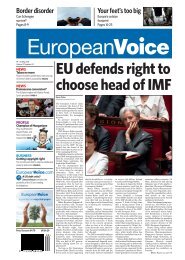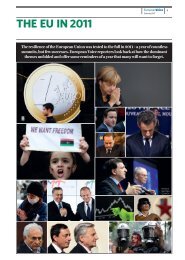special report - European Voice
special report - European Voice
special report - European Voice
You also want an ePaper? Increase the reach of your titles
YUMPU automatically turns print PDFs into web optimized ePapers that Google loves.
30 May 2013<br />
15<br />
SPECIAL REPORT<br />
Croatia<br />
BUDDY, CAN YOU SPARE A KUNA? Croatia’s economic problems<br />
WHO’S WHO The main players in the Croatian government<br />
BORDER TROUBLE The impact of accession on the western Balkans<br />
REUTERS<br />
The accession<br />
process is over<br />
and Croatia is<br />
ready to join the<br />
<strong>European</strong> Union,<br />
but the celebrations<br />
will be<br />
low-key, write<br />
Andrew Gardner<br />
and Toby Vogel<br />
Croatia will on 1 July become<br />
the 28th country in the<br />
<strong>European</strong> Union. There will<br />
be ceremonies in Zagreb, attended<br />
by the leaders of the<br />
EU’s institutions and a scattering<br />
of EU prime ministers.<br />
For the public, there will<br />
be fireworks and concerts.<br />
But, overall, the moment of<br />
accession will be a muted<br />
affair. That is partly because,<br />
for the first time since Greece<br />
joined the EU in 1981, this<br />
wave of enlargement involves<br />
just a single country.<br />
The mood in Zagreb was<br />
in any case set to be downbeat.<br />
Though the ‘Yes’ vote in<br />
Croatia’s January 2012 referendum<br />
on accession was<br />
sizeable (66%), the country’s<br />
prime minister, Zoran Milanović,<br />
acknowledges that a<br />
New kid on the bloc<br />
sense of deflation and fatigue<br />
has sapped Croats’ enthusiasm.<br />
Within the EU itself<br />
these days, few are<br />
pro-enlargement.<br />
But there is another reason<br />
for the unusual sobriety:<br />
there is little sense of apprehension.<br />
Croatia has been<br />
through an accession<br />
process that was unusually<br />
long (it applied for membership<br />
in 2003) and unprecedentedly<br />
rigorous. The result<br />
was a clean bill of health<br />
from a <strong>European</strong> Commission<br />
painfully conscious of<br />
the maladies that still afflict<br />
the EU’s two most recent<br />
members, Romania and<br />
Bulgaria (see page 17).<br />
But perhaps the noncommital<br />
calm is misplaced.<br />
The EU is taking on board a<br />
small country whose rather<br />
uncompetitive economy is in<br />
crisis – and, since it is<br />
obliged to adopt the euro at<br />
some point, its problems<br />
may soon become the eurozone’s.<br />
The EU knows full<br />
well how small countries can<br />
produce big problems.<br />
There is certainly a case for<br />
concern that Croatia will<br />
join a list headed by Greece,<br />
Cyprus, Ireland, Portugal<br />
and now Slovenia.<br />
On top of that there are<br />
peculiarities specific to Croatia.<br />
While it is small in clout<br />
and population, it has land<br />
borders of 2,372 kilometres<br />
– a larger populationto-border<br />
ratio than even<br />
thinly-populated Finland.<br />
The significant extension of<br />
the EU’s external border will<br />
make it still harder to police,<br />
and its vulnerability will<br />
surely again be an issue as<br />
Croatia moves to join the<br />
Schengen zone of passportfree<br />
travel.<br />
Then there is its recent<br />
history. Only 18 years ago<br />
Croatia was still a war zone,<br />
and, as even government<br />
categorisations suggest, it<br />
may well still be shellshocked:<br />
80,000 Croats<br />
claim invalidity benefits for<br />
post-traumatic stress disorder<br />
caused, they say, by the<br />
war – 80% of the total disability<br />
claims in the country.<br />
Might the EU be importing<br />
a nation with a highly developed<br />
sense of victimhood?<br />
Small and modernising<br />
Such concerns may, though,<br />
be over-simplistic. First, it is<br />
worth restating just how<br />
small Croatia is: its population<br />
of just 4.3 million is the<br />
seventh-smallest in the EU<br />
and 3 million less than<br />
Bulgaria’s. The accession<br />
process was long (see page<br />
17). The government is reforming<br />
the economy (see<br />
page 16). Its domestic politics<br />
features two parties that<br />
have thoroughly modernised<br />
themselves and that fit comfortably<br />
(although Croats<br />
may beg to differ) within the<br />
mainstream of <strong>European</strong> social<br />
democracy and Christian<br />
democracy (see pages<br />
17-19).<br />
Croatia’s impact on the<br />
EU itself looks likely to be<br />
limited (see page 20), and –<br />
in part because it has been<br />
forced by the EU to address<br />
the legacy of the war – its<br />
impact on its own neighbourhood<br />
could prove positive<br />
(see page 20). Moreover,<br />
it has gone through war, reform<br />
and political reinvention<br />
and its government has<br />
changed colour (albeit only<br />
twice, in 2000 and 2011)<br />
without a hiatus in the reform<br />
dynamic.<br />
4,284,889<br />
Population<br />
(2011 census)<br />
Croatia is also evolving in<br />
ways that show it to be not<br />
untypical of how society is<br />
changing across Europe. It<br />
remains a very conservative<br />
and Catholic country, but<br />
the debate on homosexual<br />
rights shows that the<br />
Catholic Church’s clout<br />
has weakened substantially.<br />
Similarly, while anti-Serb<br />
sentiment remains strong,<br />
particularly in football stadiums,<br />
attitudes to Muslims<br />
may be more liberal than in<br />
many <strong>European</strong> countries.<br />
Unlike neighbouring Slovenia,<br />
for example, it has had<br />
no disputes over minarets.<br />
Tensions with Muslims<br />
occasionally surface, but<br />
these are with Bosnian Muslims<br />
who moved to Croatia<br />
in the 1970s: these disputes<br />
have little to do with religion<br />
and more to do with the<br />
presence of a non-indigenous<br />
working class.<br />
While they cannot command<br />
enthusiasm on 1 July,<br />
Croatia’s political leaders<br />
will be able to request,<br />
with considerable justice,<br />
credit for the changes they<br />
have achieved in a country<br />
that is the first since 1952 to<br />
join the EU within two<br />
decades of being engulfed in<br />
war.










